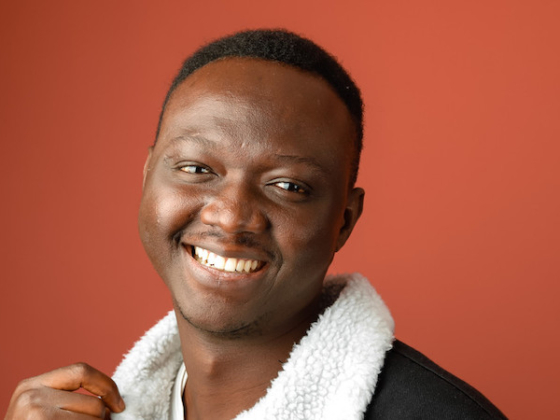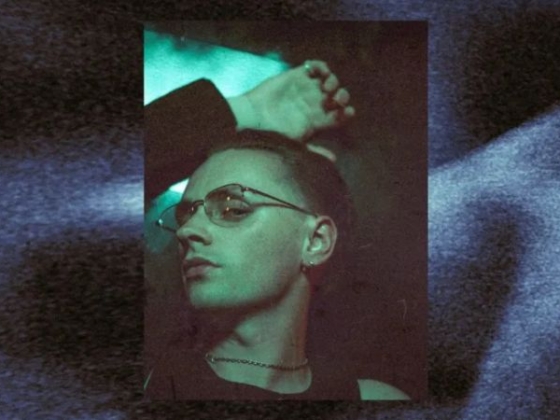New York-based multi-instrumentalist and composer Vines (AKA Cassie Wieland) has released her debut LP I’ll be here.
The culmination of years experimenting with soundscapes, I’ll be here is the end result of Vines’ evolution from a singer-songwriter into the cinematic nature of musical minimalism.
“It was through making music that I was able to meet myself,” says Vines. “Anything I’m going through or feeling is something that somebody else out there can relate to, and that’s really special to me.”
Working with longtime collaborator, four-time Grammy-nominated engineer Mike Tierney, percussionist and composer Adam Holmes, violinist Adrianne Munden-Dixon, cellist Helen Newby, bassist Pat Swoboda, and saxophonists Julian Velasco and Jordan Lulloff, Vines’ I’ll be here LP feels like a journal of thoughts and ideas brought to sonic life.
According to Vines, it was important to work with friends: “Everything that was supposed to happen came together so easily because of the people involved.”
Tender and melancholic throughout, Vines cycles through topics throughout the LP, touching on sickness, moving on from difficult things, and learning to accept oneself wholeheartedly.
The first track, “I’m getting sick,” opens with echoing, distant strings and piano, a palpable sense of feeling lost threaded through from the very first notes. The effect is stark, droning, and somewhat impersonal—much like the feeling of sickness itself: confronting and lonely. The repeated piano notes and violin trills evoke a sense of going through the motions while quietly crying through a difficult time. It’s a perfect opener for what’s to come.
The second track, lead single “Evicted,” also opens with echoing piano—this time with a more straightforward melodic line. Vines’ vocoded vocals drift in gently, whisper-thin and robotic, posing the pained question: am I getting sick? / or am I over it? / am I being born? / or just evicted?
The anguish is palpable, and Vines repeats these questions as the percussion enters—a sporadic drum hit eventually joined by slow, mournful strings, until a synthesizer announces itself, oddly mechanical in the middle of an otherwise very earthy-sounding track. Each instrument builds to a fever pitch before slowly tapering off, leaving only a twinkling piano and a final burst of violin.
The third track, the blisteringly short 1-minute-50-second “We’ve Made It This Far,” feels like the sounds of an extremely early morning composed into a sonic body. It opens with what resembles a bird-like frenzy in the sky, paired with a long, drawn-out screeching note—something between a painful yawn and the jolt of sudden wakefulness. The strings gradually form into something more corporeal toward the end of the track, as if they themselves have fully woken up after the fluster of dreaming.
The fourth track, “Undercurrent,” opens with a hazy, discordant symphonic drone that gives way to scratchy strings and airy, wordless vocals, mimicking the ebb and flow of the sea. As the track progresses, bassy synths wash in, much like wading into deep water, before percussion kicks in around the three-minute mark. Entirely wordless, the “undercurrent” of this track is a flowing sense of weightlessness that gradually grows heavier before fading out.
The fifth track, “King of Swords,” starts off more straightforwardly than any other on the album—with a more conventional structure to match.
A gentle, plucked banjo melody sets the scene for Vines’ ethereal vocals, as thin and hazy as ever, the words almost impossible to make out.
Lilting violin breathes throughout, contrasted by stark pizzicato violin notes that cut through, underscoring the lyrics: I’m not for myself / I’m for everyone else / I’m not for myself / I’m for everyone else. More than any other track, this one most clearly confronts heartbreak—specifically, the kind that comes from losing your sense of self in relation to others. It’s devastating, and it’s bound to leave a lasting impression. If this LP has anything resembling a radio single, it’s “King of Swords.”
Track six, the succinctly titled “Omw,” opens with twinkling piano top notes, weighed down by the soft drone of bowed cello strings.
It begins peacefully, before the sounds begin to pitch down—unsettling and reverberating. This eerie shift is heightened by haunting Wurlitzer notes, which eventually, like most tracks on the LP, fade into nothing. Whatever Vines is on her way to, it feels like she’s arrived.
On the aptly named “Happy is Hard,” a crackling background sound runs throughout—something like a fire burning or distant typing. This is Vines at her most minimalist: no definite notes, just sliding tones from each instrument gently pushing against the nearly empty soundscape. Everything feels echoing, far away, and undefined. It may have a straightforward title, but the sound is anything but.
The eighth track, “Tired,” brings back Vines’ vocoded vocals, her eerily robotic voice lamenting: I was told they’re out to get me / that the world was going to end me / but I haven’t seen it yet.
A gentle melody rocks back and forth between three banjo notes, swaying like the breath of sleep, with low piano chords mimicking deep, weary breathing. “Tired” plays like a haunted interpretation of a lullaby—with deeply melancholic results.
The penultimate track, “Keep Driving,” sounds as if it was recorded inside a long, dark tunnel. The echo that permeates the rest of the album is fully present here, conjuring the sound of an orchestra tuning up as violins, vocals, and synths drift without melody or structure. “Keep Driving” feels like a swirl of aimless thoughts—the internal soundtrack to the monotony of simply pushing forward.
Closing the album is “I’ll Be Here,” a deep, rumbling finale to the record’s otherwise whisper-thin body. It features the low drone of organ and double bass, set against a surprising rum-pum-pum of marching snare drums. This track pulls everything from the rest of the album into one final moment: more echoing vocals, a fuller arrangement of instruments, and the richest soundscape of all ten tracks.
Vines once again forgoes lyrics, harmonizing with her fellow musicians instead. True to form, the album doesn’t end so much as it fades—anything more definitive wouldn’t feel right after ten tracks of carefully crafted ephemerality.
Overall, I’ll Be Here is a stunningly gentle and quietly unsettling piece of soundscape work. The instrumentation is thoughtfully varied and used to great effect. If there’s one question the LP raises, it’s whether it works as a cohesive whole—but maybe it isn’t meant to.
With recurring themes and tonal threads throughout, Vines’ stated aim was to build this album like a journal—fragmented, reflective, and deeply personal. In that, she absolutely succeeds.









